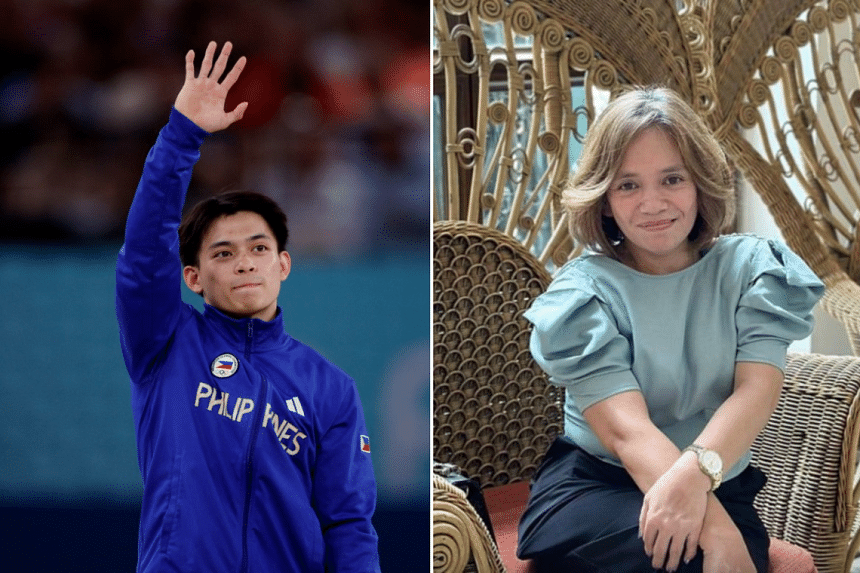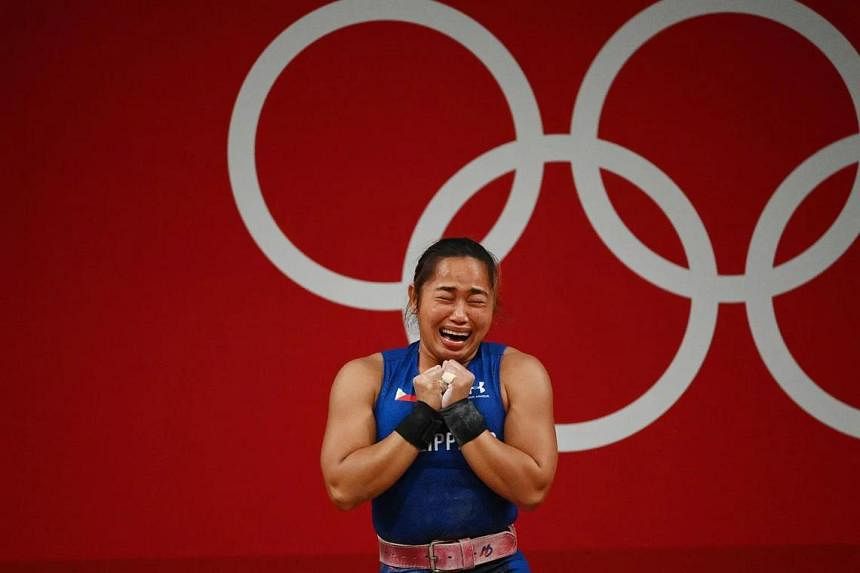Mother-son feud playing out in public dulls shine of Filipino gymnast Carlos Yulo's gold medals


It was a Cinderella story that somehow turned into a tawdry telenovela.
Over two days last week, 24-year-old Filipino gymnast Carlos Yulo took the top spot in the floor exercise and vault events at the Paris Olympic Games.
It was a historic achievement: Two Olympic gold medals that added to the first that the Philippines — after a 97-year wait — clinched at the Tokyo 2020 Olympics, courtesy of weightlifter Hidilyn Diaz.
There was a massive eruption of pride and joy back home, as an archipelago of over 100 million people basked in the sheen of his medals.
Then, the online mob descended.
Keyboard warriors were quick to point out that Yulo left out his mother, Mrs Angelica Yulo, from people he thanked soon after he won his medals, and that she — rather than congratulating her son — reposted on her Facebook page a news item supporting a Japanese gymnast who had beaten Yulo in the past.
Social media sleuths then dug up old Facebook posts by Mrs Yulo that revealed a long-simmering dispute with her son, essentially over money.
Apparently, Yulo felt aggrieved when his mother took the prize money he won at the 2022 World Championships from his account without telling him.
Mrs Yulo, in turn, was outraged that her son would accuse her of stealing from him, and insisted that she withdrew just enough money from Yulo's account for the family's needs.
She also took a swipe at Yulo's girlfriend, an Australian, claiming the girl had been a bad influence on him and had been trying to drive a wedge between her and her son.
This mother-son feud has been playing out in public for days, dulling some of the shine of Yulo's medals.
Filipinos of all stripes chimed in, took sides and lost sight of the importance of what Yulo had achieved.
Mrs Yulo was slandered in one post as "the most toxic mother of the year".
Some reminded Yulo that whatever grievances he had, he should not have said such harsh words about his mother. Others took misogynistic potshots at his girlfriend, Chloe San Jose, an online content creator.

They found a looking glass and saw in it a bitter family conflict that is taking their mind off the drudgery of their own lives, say observers.
"Everybody has found their 'villains' in this particular episode. They think it's the girlfriend. They think it's the mother. So it makes for the complete drama," sports analyst Sev Sarmenta told The Straits Times.
"And do you blame the news? No, you cannot. There's a story there: Is there a falling out? It becomes accentuated by the fact that there's a tremendous amount of money now that's going to come Carlos' way."

Others have said that a more constructive way to look at this family drama is to draw a line between it and what ails Philippine sports.
Most of the country's athletes live off meagre stipends they get from their respective sporting associations.
They usually make enough just to cover their own expenses. Sometimes, the money is woefully short that they have to get a side gig or turn to a sympathetic sponsor to cover the shortfall.
There are wealthy benefactors and corporations hovering in the wings, but they seldom open their wallets for also-rans and athletes who — although they are the most likely to land on a podium — are in less glamorous sports like weightlifting, boxing, gymnastics or figure skating.
Weightlifter Hidilyn Diaz was reduced to begging for financial aid from private sponsors, even after she had already proven herself by winning a silver medal at the 2016 Olympics in Rio de Janeiro.
"Is it okay to ask for sponsorship from private companies towards Tokyo 2020?" she asked her followers in an Instagram post in 2019.

She revealed that back then all she was getting was a monthly allowance of about 26,000 pesos (S$600) from the Philippine Sports Commission.
"I'm so, so desperate. I need financial support. Do you think it's okay? I'm so embarrassed, but I'm here shamelessly asking for help so I can realise my dream to bring home a gold medal," she pleaded.
But instead of getting help, an online lynch mob skewered her. Many accused her of behaving like a "diva", while some demanded that she be booted from the country's roster of athletes for the Tokyo Olympics.
One said he would eat "carabao dung" if Diaz ever won a gold medal, referring to the water buffalo.
That was what she did: Win a gold medal at the Tokyo 2020 Olympics, and suddenly the floodgates opened.
Diaz received 35 million pesos in financial incentives from the government and two Filipino tycoons, a landed estate north of Manila, and a car.
A property developer handed her the keys to a 17 million peso condominium in an upscale Manila district.
But Diaz's rags-to-riches story is lightning in a bottle.
[[nid:696720]]
Most Filipino athletes go through the same meat grinder that she did, but they are unlikely to see the same bonanza that she got, because odds are they will remain stuck in the middle of the pack.
It isn't for the lack of trying.
Flyweight boxer Irish Magno said in a Facebook post in 2019 that it had been very hard for her to focus on training for the Olympics when she had not received her allowance for two months, and she was her family's breadwinner.
"It's so hard to focus on preparing for the Olympics when you know your family back in the province hardly has anything to eat. It breaks my heart knowing that they are all depending on me," she said.
Magno had an early exit at the Tokyo Olympics and was not in the boxing team that went to Paris.
President Ferdinand Marcos Jr himself acknowledged the lacklustre and inconsistent support from the government that Filipino athletes are getting.
"I am always a little embarrassed when I see that we are not supporting our athletes and our coaches and our trainers and all the support groups, even the families," he said.
"Considering the honour and the pride that you bring to the Philippines, it seems that what we in the government (do) is not commensurate to the great service that you do for our country and our people."
In the afterglow of Yulo's triumphs, sports is again at the centre of Congress' attention.
In a resolution congratulating all 22 Filipinos who competed in Paris, Congress acknowledged the lack of government support for the country's athletes.
[[nid:696829]]
"Usually, Filipino athletes are left to their own devices in order to train, enter and qualify in local and international competitions, forcing them to seek financial and professional assistance from relatives and friends, the private sector, and even foreign coaches and teams," the lawmakers said.
They lamented that the proposed 2025 budget for sports had been slashed to 725 million pesos from 1.156 billion pesos in 2024.
They called for more far-reaching changes in sports.
"The current system primarily focuses on rewarding athletes after they win, rather than providing consistent and substantial support throughout their training and preparation," they said.
Sarmenta, the sports analyst, said "the business model, the financial angle of supporting athletes, has to change", so that it can produce elite athletes like Yulo and Diaz.
"They don't do it by themselves. They need a team. They need foreign coaching. They have to travel abroad to compete. They need nutritionists. They need psychologists. It's a whole new different ballgame," he said.
The congressional resolution, though, is just an expression of sentiment. Considering past experiences, that is likely to wane as the elation over Yulo's gold medals ebbs and the nation's attention is drawn towards something else.
As for Yulo, he's set for a cushy future.
He is going home to over 50 million pesos in cash and non-cash perks, including a three-bedroom condominium, and lifetime supplies of free buffets, baked mac and cheese, and grilled chicken.
As for Yulo's messy affair with his mother, Sarmenta said: "I think the family should just settle this in their backyard. I'll just say one thing — it's none of our business."
[[nid:696555]]
This article was first published in The Straits Times. Permission required for reproduction.